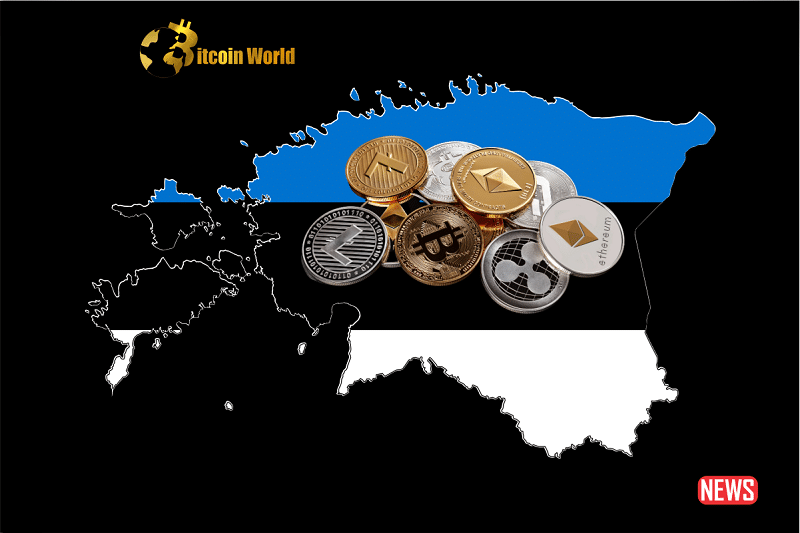The cryptocurrency landscape in Estonia has recently undergone a significant shift. Imagine a digital gold rush town suddenly facing a sheriff with a new set of rules. That’s essentially what happened as Estonia implemented enhanced anti-money laundering (AML) and Terrorist Financing Prevention regulations in March. The result? A substantial number of Virtual Asset Service Providers (VASPs) – around 400 – have either voluntarily closed their doors or had their operating authorizations revoked.
Why the Sudden Exodus of Crypto Firms?
So, what triggered this mass departure? Estonia’s updated regulations brought about several key changes that significantly impacted crypto businesses:
- Broader VASP Definition: The scope of what constitutes a VASP was expanded, bringing more entities under regulatory scrutiny.
- Real Ties to Estonia Required: No more shell companies! Enterprises now need to demonstrate genuine operational links to Estonia.
- Increased Costs: License fees were raised, adding to the financial burden.
- Higher Capital Requirements: VASPs now need to hold more capital, ensuring greater financial stability.
- Stricter Reporting: Enhanced information reporting requirements were introduced, demanding greater transparency.
- Implementation of FATF Travel Rule: This crucial rule mandates the exchange of originator and beneficiary information for virtual asset transfers, aligning Estonia with international AML standards.
The FIU’s Perspective: A Necessary Step?
The Estonian Financial Intelligence Unit (FIU) has been at the forefront of enforcing these new regulations. According to their statement on May 8th, approximately 200 domestic crypto service providers voluntarily shut down due to the March 15th amendments. Furthermore, around 189 others had their authorizations withdrawn for “non-compliance with the requirements.” This proactive approach highlights Estonia’s commitment to combating financial crime within the digital asset space.
Matis Mäeker, Director of the FIU, emphasized the relevance of these changes, stating, “Given the documents submitted by the service providers who have lost their authorizations, as well as their methods of operation and the risks involved, it can be argued that the legislator’s response with regard to the amendments to the Act, and the supervision activities both before and after the amendments, have been relevant.” He even hinted at some surprising discoveries during the authorization renewal process.
What Were the Red Flags?
The FIU’s scrutiny uncovered several concerning practices among the non-compliant firms. These included:
- Fake Board Members and Contacts: Some companies registered individuals as board members or corporate contacts without their knowledge.
- Fabricated Credentials: Resumes were found to contain falsified professional qualifications.
- Unoriginal Business Plans: Multiple companies presented virtually identical business plans, often lacking any logical connection to Estonia.
The Bigger Picture: Why the Push for Stronger AML?
Estonia’s recent actions are not isolated. The country has been actively strengthening its AML framework for several years. A significant catalyst for this was the 2018 revelation of a massive $235 billion money laundering scandal involving the Estonian branch of Danske Bank. This event served as a stark reminder of the vulnerabilities within the financial system and the urgent need for robust safeguards.
The ongoing geopolitical climate, particularly the conflict between Russia and Ukraine, has also played a role. Estonia has been a strong advocate for strict AML regulations to help cut off financial flows supporting Russia’s military actions and to protect the integrity of international financial systems.
Looking Ahead: The Influence of EU Regulations
Another significant factor driving Estonia’s stricter stance is its membership in the European Union. The impending Markets in Crypto-Assets (MiCA) regulations, slated to take effect in early 2025, will impose comprehensive AML and terrorist financing prevention rules on crypto companies operating within the EU. Estonia’s recent actions can be seen as a proactive step towards aligning with these future requirements.
What Does This Mean for the Future of Crypto in Estonia?
While the exit of a large number of crypto firms might seem like a setback, it can also be viewed as a necessary step towards building a more secure and trustworthy crypto ecosystem in Estonia. As of May 1st, the FIU reported 100 active crypto companies registered in the country. This suggests a shift towards a smaller but more compliant and legitimate sector.
Key Takeaways:
- Estonia’s stricter AML regulations have led to a significant reduction in the number of registered crypto firms.
- The new rules aim to enhance transparency, prevent money laundering, and combat terrorist financing.
- The FIU’s active enforcement has uncovered concerning practices among some VASPs.
- Estonia’s actions are influenced by past scandals, geopolitical events, and upcoming EU regulations like MiCA.
- The long-term goal is to foster a more sustainable and compliant crypto industry.
Actionable Insights for Crypto Businesses
For crypto businesses operating in or considering operating in Estonia (or any jurisdiction with tightening regulations), here are some crucial insights:
- Prioritize Compliance: Robust AML/CFT compliance is no longer optional; it’s a fundamental requirement.
- Establish Genuine Presence: Ensure your business has a real operational footprint in the jurisdiction.
- Verify Information Diligently: Thoroughly vet board members, contacts, and employee credentials.
- Develop Unique and Viable Business Plans: Avoid generic or copied proposals.
- Stay Informed: Keep abreast of evolving regulatory requirements and adapt proactively.
Conclusion: A Stronger Foundation for Crypto in Estonia?
Estonia’s recent regulatory overhaul in the crypto sector represents a significant shift. While the departure of numerous VASPs might raise eyebrows, it signals a firm commitment to establishing a more secure and legitimate digital asset environment. By prioritizing compliance and weeding out bad actors, Estonia is potentially laying the groundwork for a more sustainable and trustworthy future for the cryptocurrency industry within its borders. The message is clear: in the world of crypto, adherence to regulations is not just a hurdle, but a cornerstone for long-term success.
Disclaimer: The information provided is not trading advice, Bitcoinworld.co.in holds no liability for any investments made based on the information provided on this page. We strongly recommend independent research and/or consultation with a qualified professional before making any investment decisions.





